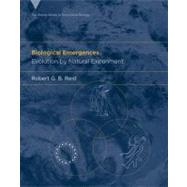
| Series Foreword | p. xi |
| Preface | p. xiii |
| Introduction: The Re-invention of Natural Selection | p. 1 |
| Paradigm Drift | p. 27 |
| Prologue to Emergence | p. 67 |
| Evolution by Association | p. 95 |
| The Physiological Arena | p. 137 |
| Development and Evolution | p. 179 |
| Epigenetic Mechanisms | p. 223 |
| Orthogenesis | p. 267 |
| The Re-invention of Emergence | p. 289 |
| From the Particular to the General | p. 329 |
| An Emergence Theory | p. 363 |
| A Biological Synthesis | p. 401 |
| Notes | p. 437 |
| Bibliography | p. 465 |
| Index | p. 505 |
| Table of Contents provided by Publisher. All Rights Reserved. |
The New copy of this book will include any supplemental materials advertised. Please check the title of the book to determine if it should include any access cards, study guides, lab manuals, CDs, etc.
The Used, Rental and eBook copies of this book are not guaranteed to include any supplemental materials. Typically, only the book itself is included. This is true even if the title states it includes any access cards, study guides, lab manuals, CDs, etc.